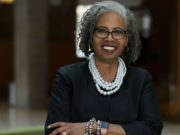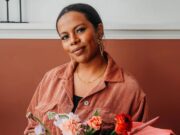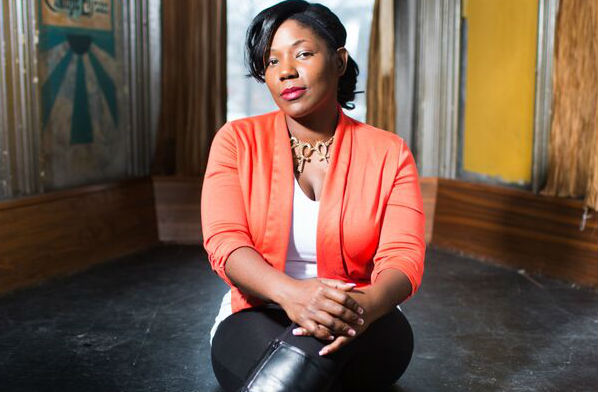When we put Brandi Grayson on our list of the 28 most influential African Americans in Wisconsin, we called her “disrupter of the year.” Her tactics rub some the wrong way, but they do the job — and command attention. Last year, she and other advocates formed Young Gifted and Black, a local organization loosely affiliated with Black Lives Matter.
She’s put racism front and center in every conversation. Inequity and injustice– both personal and systemic — are never far from her mind.
Rank your Top 5 MCs. Eve, Tribe Called Quest, Digable Planets, OutKast, MC Lyte.
A lot of people have their own opinions of who you are. In your own words tell us: Who is Brandi Grayson? Brandi Grayson is a 35-year-old Black woman. Who happens to be a grandmother. I am a grandmother of three beautiful little girls: Markia (2), Jazz (1) and Nahla (6 months).
I am the biological mother of two girls, Antavia, 21 (Nahla’s mom) and Ciara, 15. I am also the mother of Quetta, 21 (Markia’s mom) and Destiny, 15 (Jazz’s mom).
I’ve lived in Madison since the age of 10.
Prior to living in Madison I lived in Chicago. During my short stay in Chicago I experienced a lot of trauma, abuse and neglect. Like many children living in the inner city, I joined a gang at a very early age.
I surprise myself sometimes when I think about the reality in which I’ve lived. Surviving the streets of Chicago at the age of 8; being sent to Los Angeles at the age of 7; watching my mother prostitute; panhandling to eat.
My grandmother died and I was sent to Madison to live with my mother who had relocated here a couple years prior.
Within a few months of living with my mom, I was placed into foster care.
I was in and out of the foster care system most of my life. Even in Chicago I was part of the system.
My childhood was unstable, but I was a smart kid and extremely resilient. I was always happy, particularly at school. Despite my hair not being combed and not having clothes to wear, I was excited to get out of the house.
In high school I found stability when I was placed with Rita Adair. She provided me with stability and security. Thus I was able to thrive. I had a baby at the time, Antavia, and she was my priority. Nothing mattered but loving her and providing her with the best. And that’s what I did.
Despite bad relationships and job losses after high school, I was able to get my stuff together. I went back to college. I started reading and writing. I found that I was extremely passionate about the plight of Black people. I was hungry for the answer of WHY my people suffered so?
Which led me to all kinds of theories. Theories rooted in theology, theories rooted in white patriarchy, in Ancient Egyptian Kemet and other ancient civilizations.
I also stumbled upon great works by great leaders such as Dr. Amos Wilson, Carter G. Woodson, Dick Gregory, Dr. John Henrik Clarke, Bell Hooks, Patricia Hill, Frances Cress Welsing, etc. I found stories of great Black leaders and theories and explanations rooted in the black experience. It was nothing close to what I had learned up until that moment. So in essence I found myself. And when I did, I became unstoppable.
I was able to see my greatness and my purpose. I was able to understand all the trauma, pain, abuse and feelings of nothingness that had prepared me for this moment.
So Brandi Grayson in essence represents the poor families in Madison. I represent those who have survived poverty. I represent those who will never see opportunities or have access to resources that would set their lives on a different trajectory.
I am that woman you judge in the school with her children crying with her on the phone. I am the woman who went to college while on a Section 8 voucher for housing and supported by food stamps and Medicaid.
I am that girl in the classroom whom teachers dismissed, disregarded, or had a hard time communicating with.
I’m that little girl who grew up in the foster care system. Whose mother suffered and suffers from mental wellness challenges and drug addictions.
I’m that girl who folks said wouldn’t amount to nothing.
I’m that little girl who begged God to change my skin so kids and adults wouldn’t call me mean names.
I am that girl who dreamed about a different reality, and believed that all white people lived in nice houses and drove nice cars.
I am that girl who prayed to God to be different so everyone would like me. And no matter how hard I tried to fit in, I never fit. In church, I asked too many questions. In school, I asked too many questions. At home, I asked too many questions.
I am that girl whose only desire was and is to be loved and accepted for all of me. Not pieces of me that feel good. But all of me. The good, the bad and the ugly.
I am that girl who grew up without a father, who still struggles to feel whole as a result.
I am that little girl who grew up alone and too fast, but somehow I made it.

I am the 350. I am part of the most disenfranchised, most marginalized—the forgotten, the undeserving and the uncared for. Yes. It is true. That is me.
I am a woman who has dedicated her life to the fight for Black Liberation. I am a woman who anchors herself in personal development—getting better at everything that I do, in every possible way.
I am a woman in search of ways to heal, and I’ve found some.
I am a woman who works 45 to 60 hours a week for my 9-5 job, and another 10 to 20 doing activism work. Working not because I have to, not because I’m paid to or funded to, not because we are responsible for white privilege, white power or racism, but because it’s the ONLY thing I can do to stay sane in an insane world.
I am that Black woman whose anger cannot be comprehended from the luxury of white privilege.
Despite all that makes me who I AM, most importantly I am Lover of LIFE! I love to read books and articles. Watch documentaries and ride my motorcycle (a 2007 Yamaha V Star 1100). I love spending time with good people and family. I love hosting dinners. I love expanding my knowledge. I love trying new things. I love laughing. I love my children with ALL that I am. I love my grandchildren in a way that can’t be explained with words. When I look at them, I feel whole. I feel like I have done everything right. I’m filled with love and HOPE. It’s something special about being a grandmother that makes you thankful all over again for your children. I love life. I love people. I love working with my people and for my people.
I love LOVE!!!
Do you prefer being called Black or African American? I prefer to be called Black American. One, I don’t know where my ancestors are from, where they’re from in Africa; two, I don’t have access or direct connection to African culture, except what I read; three, I believe the term African American is reserved for people whose family is first generation immigrants from Africa, which I am not. My people were not immigrants. They did not come here looking for a better life. We were brought here and forced to become inanimate objects. If it were up to me, I would call all Black Americans “the stolen children of Africa.”
In past interviews you mentioned Dr. Martin Luther King’s disruptive tactics and reasoning. At the core of what drove Dr. King was his faith in God. What is your driving force? The driving force behind me is my burning desire to be free. To be free from my current existence, which is rooted in making sure white people feel safe. My ability to exist is measured by how safe I make white people feel. I have to make sure they feel comfortable with the words that come out of my mouth. I have to make sure they feel comfortable when I enter the store with two of my friends. I have to make sure they feel comfortable if I’m walking towards them at night. I have to make sure if I get pulled over, that I say or imply nothing that could or would be seen as rudeness or lack of respect. The consequence could be my life.
I have to make sure I give space to white people when they’re dealing with white fatigue, or I might lose my job. I have to make sure when I respond to racist behaviors, comments or suggestions, that I respond in a way that is safe for the white person who offended me.
I have to make sure when I’m expressing my emotions, my hurt, my pain, my grief—over the bloodshed of my people—I have to make sure white people around me don’t feel like I’m attacking them or blaming them. Because then I become the angry black woman who’s always pulling the race card.
I have to make sure they’re comfortable; thus I have to follow their rules, understandings, matrices, frameworks, ideologies, culture, etc.
I have a burning desire to be free from all of that. To self-actualize as I see fit based on my understanding of my existence. I desire to have dominion over my life.

Tamir Rice was murdered at the age of 12 because he was not free to be a child. He was not free like other boys his age to play with a toy gun; thus his life was taken. Tony Robinson wasn’t free to be a boy. You know the saying, “boys will be boys.” That doesn’t apply if you’re black. It’s not allowed. To do so sparks fear into certain people. And when they feel unsafe, the black body is no longer perceived as a human, but an object that must be dealt with.
The driving force behind me is my burning desire to be free from horrific stories of our children being beaten and/or murdered by grown men in uniforms.
I have the burning desire to be free from people telling me what I must do to be accepted. I have a burning desire to SPEAK my truth without having my truth questioned and/or dismissed because it doesn’t align with the truth of my oppressor.
My burning desire for black liberation is my driving force AND God is my driver. God is the Creator of my soul — and thus I AM.
Who has had a bigger impact on the African American culture, Jay-Z or President Obama? I believe they have similar impacts that manifest differently.

Jay Z represents the power that comes with money, the power that comes with playing the game of capitalism. Jay Z represents the dreams and hopes of many of our poor children and families.
He represents that which we are told we are capable of achieving as children. We can aspire to be a rapper, a singer, an athlete or a drug dealer, but nothing more.
Obama represents what it means to have power and a title in name but NOT in actuality. Obama is the president of the United States of America and there is nothing he can do about our children dying in the streets. He represents just how powerless we are as a Black Nation.
The same holds true of Jay Z. Despite all his money, all his fame and power, he is powerless. He can’t do anything about Black people dying every eight hours due to White Patriarchal Supremacy that controls and rules every system.
The impact on Black Americans is that we know our place in America. We know Jay Z and Obama are representatives of the objectification of our entire being. We also know that we only have two options: become that which is violently oppressing us, or fight with all we have until our last breaths.
You have become a public figure. How has that affected your life, for better and for worse? There has been much more for the better. I would say I’ve learned so much over the last year about politics, agendas, affiliations, power dynamics, who controls who, unspoken allegiances, etc.
I’ve learned that my voice does matter. I’ve learned just how powerful people power is. I’ve also learned patience. I’ve learned the pain behind the weight of racism from the white perspective. I’ve learned that most people desire to do the right thing and just don’t know how.
I’ve learned how difficult it is for black people to effect change from within systems. I’ve learned that systems are designed to eliminate those who desire real change. I’ve learned if I don’t play by the rules, even folks who look like me will stand against me.
I also learned that if I don’t take care of me, no one will. I’ve learned not to take things that people say or do personally. I’ve learned that it’s okay to be me. Even if being me doesn’t work for other people. I’ve learned how hard it is to walk in love when you are surrounded by hate. I’ve learned a lot. Some lessons were growing pains and other lessons left scars.
Many amazing relationships and friendships grew out of the work of YGB. I meet some amazing people. My ideas and beliefs around transgender, non-conforming, queer, gay, and white allyship was challenged and polished. I grew personally, spiritually and emotionally.
But there have been some changes for the worse. The harassment and fear of harassment by the hands of the Madison Police Department is the worst thing that has happened. A close second is the hate that I experienced and continue to experience. So much hate from so many different people.
I’m okay with people not liking what I have to say, but the nasty, hateful things that folks have done and have said to me are frightening. I’ve never said anything hateful to anyone, even when I was in pain and grieving over the loss of one of our children.
I’ve learned that change will come, but it will take a lifetime of suffering to RISE as a NATION.
Coming Thursday: find out what advice Brandi would give black police officers and school district leaders, her questions about do-gooders and what motivates her more: doubters or supporters? She has a lot of both…




























